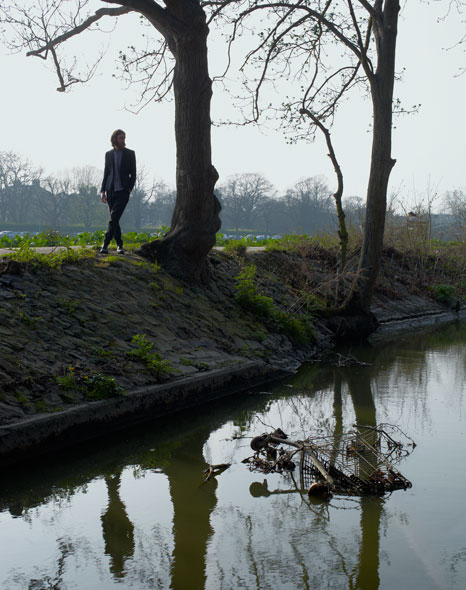The evasive and enigmatic artist provides sounds and answers
that force you to feel as he feels: lonely
Text by Katia Ganfield
Photography by Olivia Beasley

Music is something to be loved, an ethereal substance of infinitesimal vibrations that evokes the pain and glory of its human producers. This is where Keaton Henson’s gentle folk music lies; his raw, gentle thrumming and wavering wails rising from beneath the strata of commercial songs that seem to somehow captivate his generation. Deliberately enigmatic, Henson agreed to communicate only through written statements. Sometimes, less is more.
What makes his work so celestial is the poetic structure and artistry involved. He isn’t just a musician – he’s also a poet and an illustrator, his talents all-encompassing, as though an omniscient god of human creativity. His work is simple, drowning in it’s own beauty, yearning for the past with the power to move and bringing some people to dub him as the British Bon Iver, and others to tears.
Living in a clean flat in the London borough of Richmond that regularly encounters low-flying planes, his room overlooks rooftops, trees and other people’s gardens from behind overflowing ashtrays. Much planning went into the recording of his recently released album Dear…, carefully plotting and picking between the brief three minute intervals between planes flying overhead. If you listen carefully enough, there are parts where you can hear the soft roar of a plane rising from beneath the carefully finger-picked strings as the end of a song approaches.
Laden in Victorian clothes, Henson’s favored position is sitting hunched with eyes to the floor. The burdened pose reflects the absence and loss present in his lyrics, and it is indeed these feelings that fuel his music. The incredibly personal album finds the 23-year-old Londoner lamenting over his past love, a forlorn wave that he has ridden to write over 200 songs.
His lyrics are the powerful base that holds his music together. “My body’s weak / Feel my lungs giving up on me / I’m worried it might just be / something my soul needs,” Henson’s vulnerable vocals mutter in “Flesh and Bone”. “And I see a war on the screen / and it is cruel and unclean / but I still worry more about you / And I am rude and unkind / Have no thought / and have no time / Have no eyes, so no point of view.” He still hasn’t heard a reply from his ex-lover.
Percussion, throughout the album, is made using a variety of household items, including a cupboard and wine glasses. Ominous creaks, slams and slaps of the cupboard door and atmospheric whistling produced by the pouring of wine contrast the delicate vocals and graceful strumming, nightmares of a lonely kitchen peaking through Henson’s insulated world.
His polite refusal to engage in any press, interviews or live performances allows him to do more meaningful things instead. For his single, “Charon,” whose video sees a puppet committing suicide, he’s decided to publicize by holding a three day exhibition at London’s Blackall Studios at the end of April. Henson’s fans will be ushered one at a time into the “dollhouse-esque installation” to sit on a chair and look into a wooden house where Keaton will play one song for each person. It may seem a more tedious decision to play music for three days non stop than a one-hour gig, but it emphasizes his commitment to his craft. The exhibition is called “Gloaming,” which will also be the name of a book Henson plans to release later in the year.
Painting and illustration form a large part of his life, generating no boundaries to his creativity. Dear… saw him paint two posters which can be seen at the Foundry site in East London, one with a hare, and the other a written statement. His characters, with flailing limbs and despairing faces have adorned T-shirts for companies such as Topshop and Blood is the New Black.
The mystery surrounding him has played in his favor, with his self-released album selling 4,000 copies without any press or plays on the radio. This brings one back to contemplating the power of music, the power of his music, and a reminder that we’re all human beings, despite what we’re conditioned to think. We all have real emotions and desires, which, at the end of it all, are nourished by our love for one another.


